Unit 1 Know yourself Grammar 课件(21张)
文档属性
| 名称 | Unit 1 Know yourself Grammar 课件(21张) | 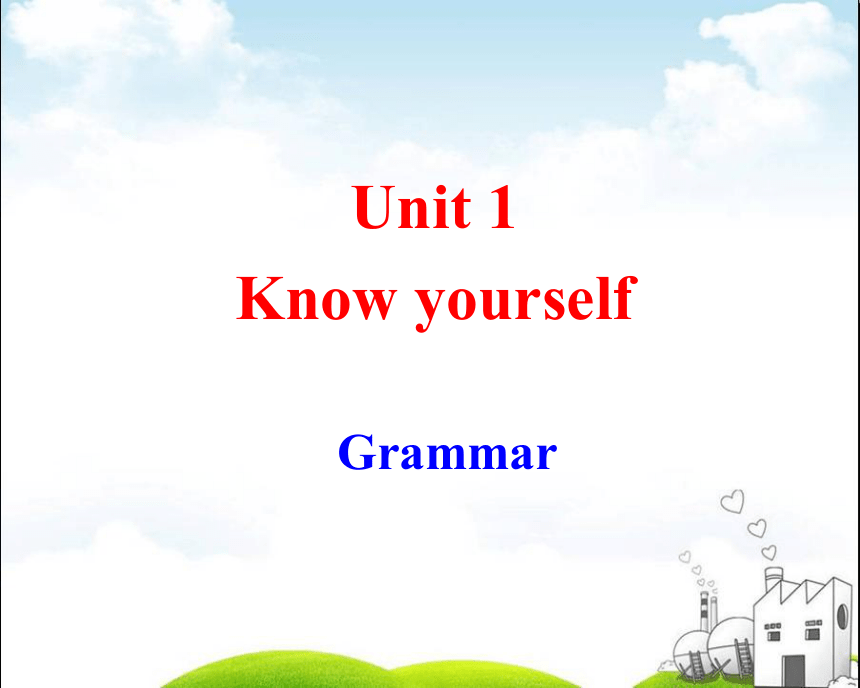 | |
| 格式 | zip | ||
| 文件大小 | 402.5KB | ||
| 资源类型 | 教案 | ||
| 版本资源 | 牛津译林版 | ||
| 科目 | 英语 | ||
| 更新时间 | 2018-01-27 08:51:32 | ||
图片预览

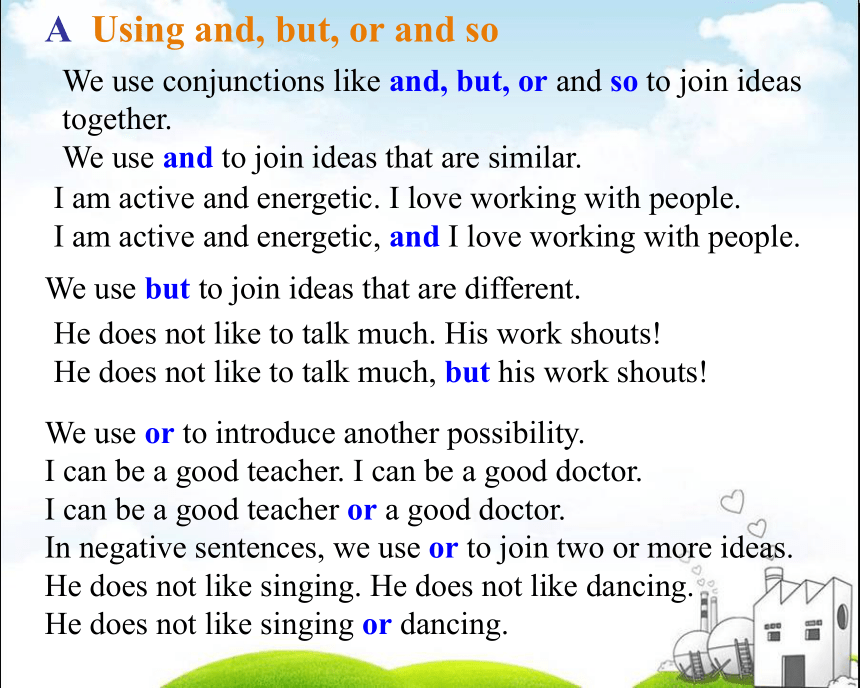
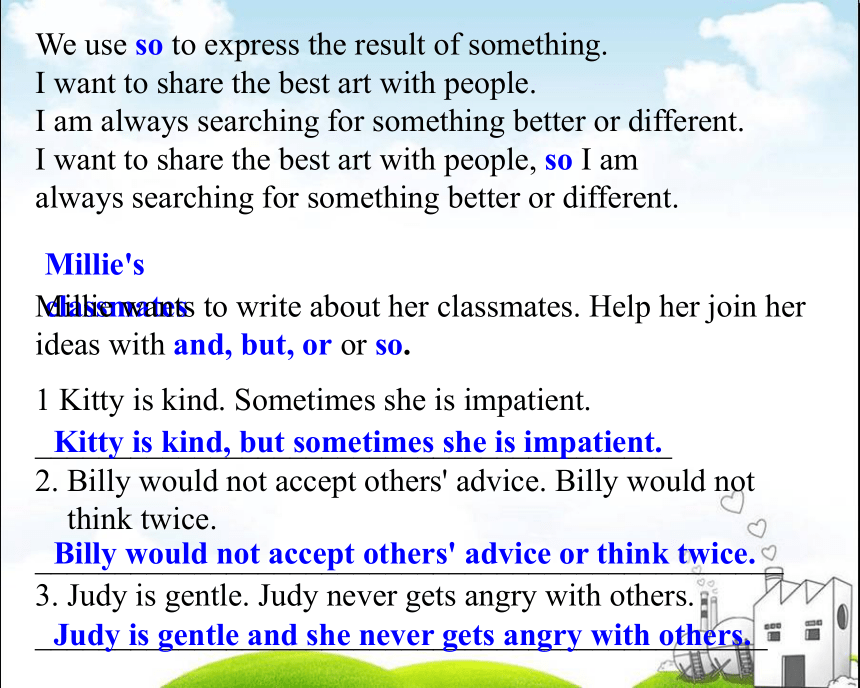
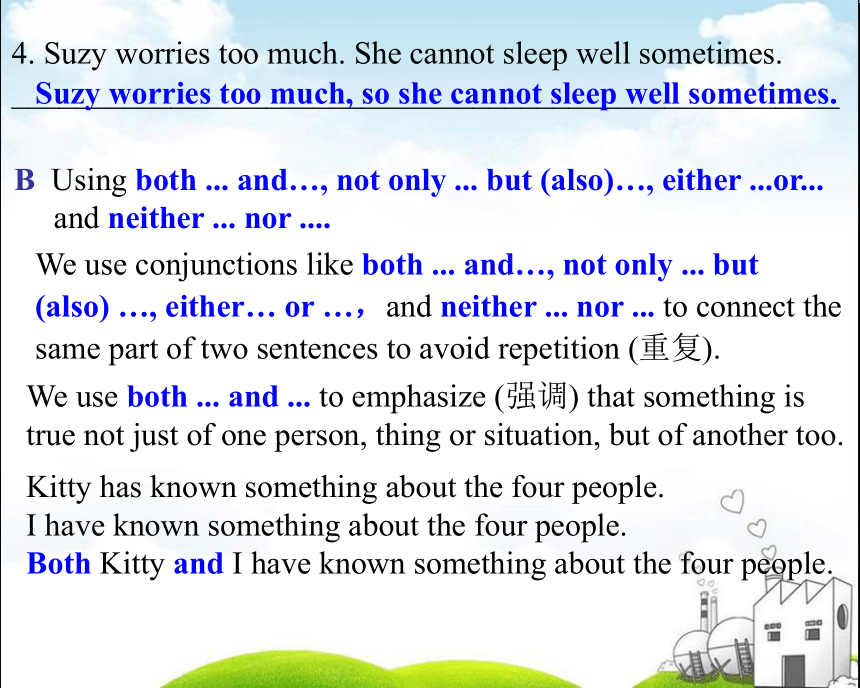
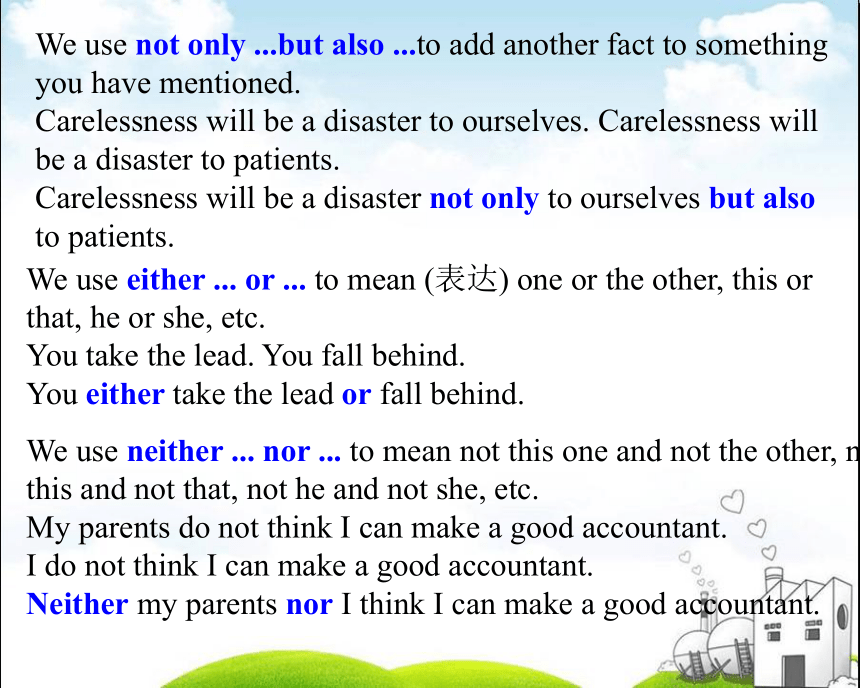
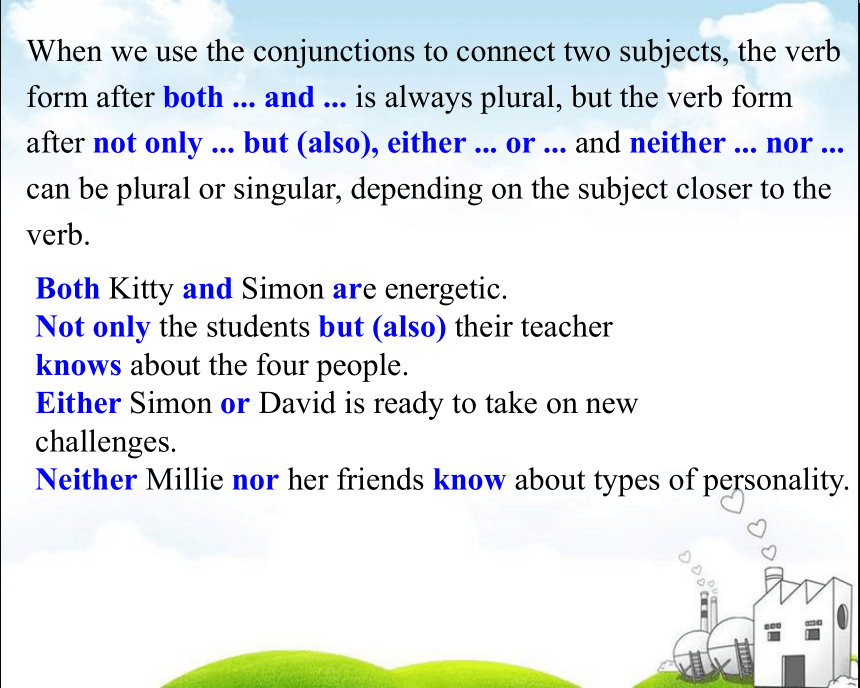
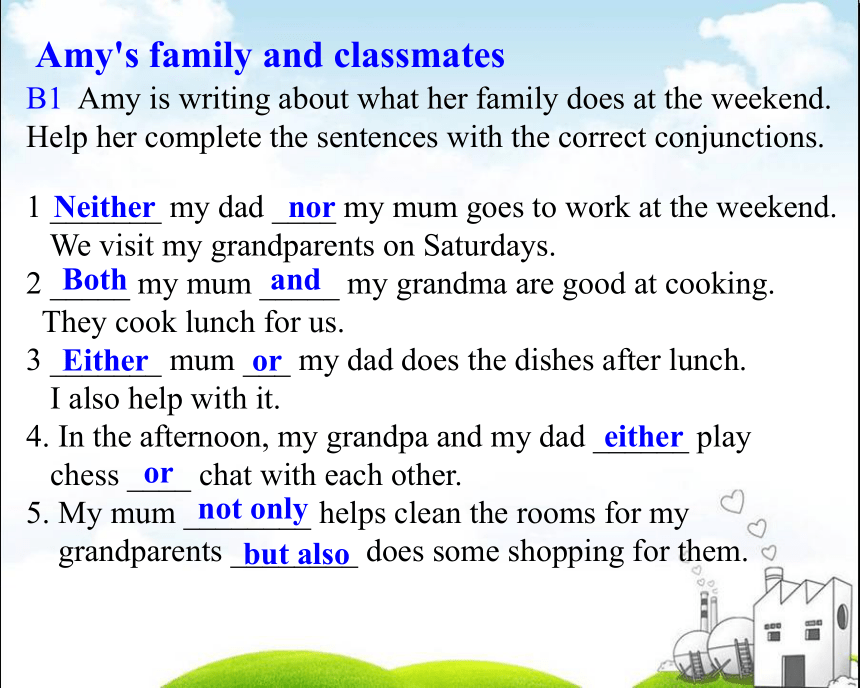
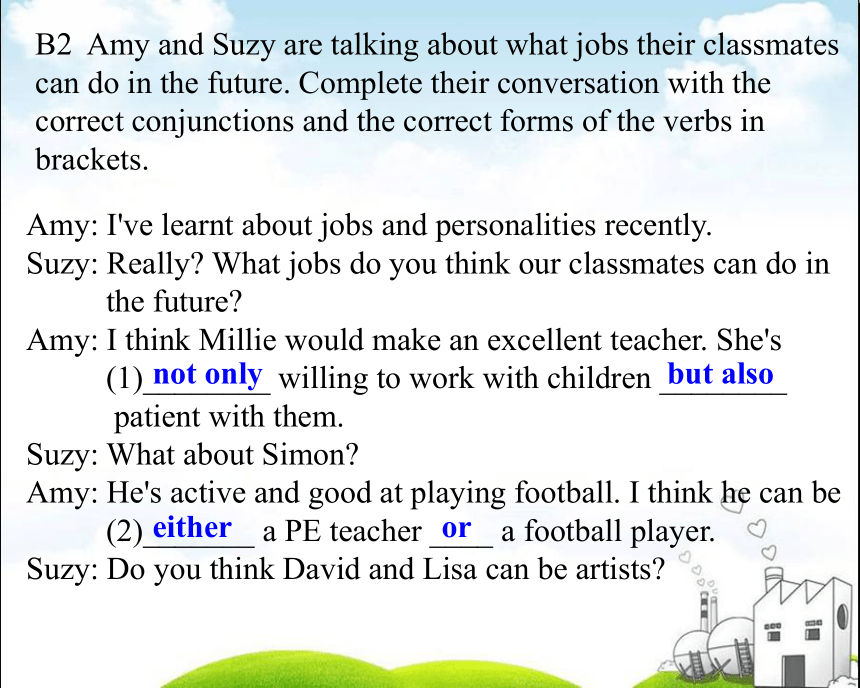
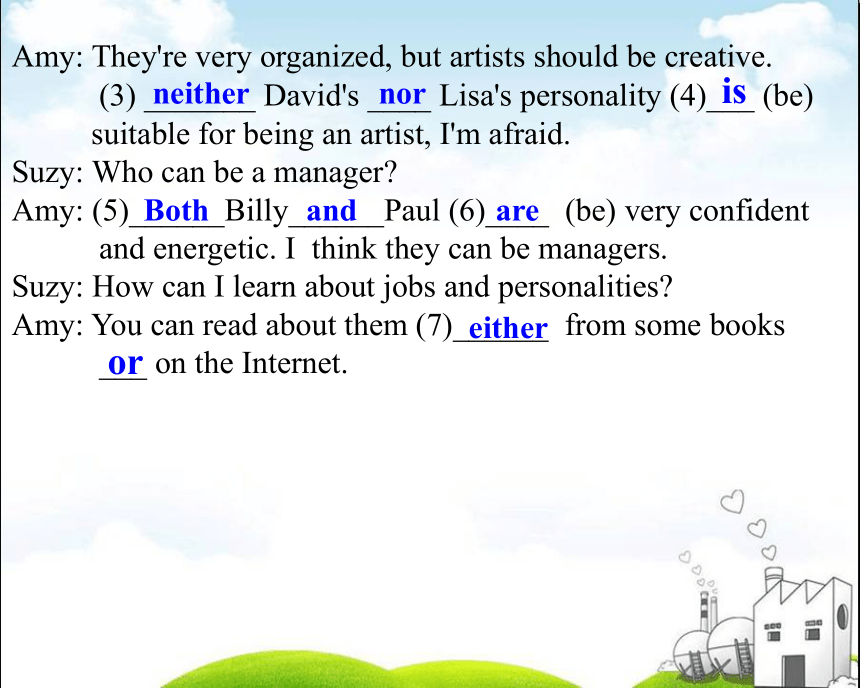
文档简介
课件21张PPT。Unit 1
Know yourself
GrammarI am active and energetic. I love working with people.
I am active and energetic, and I love working with people.We use but to join ideas that are different.We use or to introduce another possibility.
I can be a good teacher. I can be a good doctor.
I can be a good teacher or a good doctor.
In negative sentences, we use or to join two or more ideas.
He does not like singing. He does not like dancing.
He does not like singing or dancing.A Using and, but, or and soWe use conjunctions like and, but, or and so to join ideas together.
We use and to join ideas that are similar.He does not like to talk much. His work shouts!
He does not like to talk much, but his work shouts!We use so to express the result of something.
I want to share the best art with people.
I am always searching for something better or different.
I want to share the best art with people, so I am
always searching for something better or different.Millie's classmatesMillie wants to write about her classmates. Help her join her ideas with and, but, or or so.1 Kitty is kind. Sometimes she is impatient.
________________________________________
2. Billy would not accept others' advice. Billy would not
think twice.
_______________________________________________
3. Judy is gentle. Judy never gets angry with others.
______________________________________________Kitty is kind, but sometimes she is impatient.Billy would not accept others' advice or think twice.Judy is gentle and she never gets angry with others.4. Suzy worries too much. She cannot sleep well sometimes.
____________________________________________________Suzy worries too much, so she cannot sleep well sometimes.B Using both ... and…, not only ... but (also)…, either ...or...
and neither ... nor ....We use conjunctions like both ... and…, not only ... but (also) …, either… or …,and neither ... nor ... to connect the same part of two sentences to avoid repetition (重复).Kitty has known something about the four people.
I have known something about the four people.
Both Kitty and I have known something about the four people.We use both ... and ... to emphasize (强调) that something is true not just of one person, thing or situation, but of another too.Carelessness will be a disaster not only to ourselves but also to patients.We use either ... or ... to mean (表达) one or the other, this or that, he or she, etc.
You take the lead. You fall behind.
You either take the lead or fall behind.We use not only ...but also ...to add another fact to something you have mentioned.
Carelessness will be a disaster to ourselves. Carelessness will be a disaster to patients.We use neither ... nor ... to mean not this one and not the other, not this and not that, not he and not she, etc.
My parents do not think I can make a good accountant.
I do not think I can make a good accountant.
Neither my parents nor I think I can make a good accountant.When we use the conjunctions to connect two subjects, the verb form after both ... and ... is always plural, but the verb form after not only ... but (also), either ... or ... and neither ... nor ... can be plural or singular, depending on the subject closer to the verb.Both Kitty and Simon are energetic.
Not only the students but (also) their teacher
knows about the four people.
Either Simon or David is ready to take on new
challenges.
Neither Millie nor her friends know about types of personality.1 _______ my dad ____ my mum goes to work at the weekend.
We visit my grandparents on Saturdays.
2 _____ my mum _____ my grandma are good at cooking.
They cook lunch for us.
3 _______ mum ___ my dad does the dishes after lunch.
I also help with it.
4. In the afternoon, my grandpa and my dad ______ play
chess ____ chat with each other.
5. My mum ________ helps clean the rooms for my
grandparents ________ does some shopping for them.Amy's family and classmateseitherorB1 Amy is writing about what her family does at the weekend. Help her complete the sentences with the correct conjunctions.norandBothNeitherEitherornot onlybut alsoB2 Amy and Suzy are talking about what jobs their classmates can do in the future. Complete their conversation with the correct conjunctions and the correct forms of the verbs in brackets.Amy: I've learnt about jobs and personalities recently.
Suzy: Really? What jobs do you think our classmates can do in
the future?
Amy: I think Millie would make an excellent teacher. She's
(1)________ willing to work with children ________
patient with them.
Suzy: What about Simon?
Amy: He's active and good at playing football. I think he can be
(2)_______ a PE teacher ____ a football player.
Suzy: Do you think David and Lisa can be artists?eitherornot onlybut alsoAmy: They're very organized, but artists should be creative.
(3) _______ David's ____ Lisa's personality (4)___ (be)
suitable for being an artist, I'm afraid.
Suzy: Who can be a manager?
Amy: (5)______Billy______Paul (6)____ (be) very confident
and energetic. I think they can be managers.
Suzy: How can I learn about jobs and personalities?
Amy: You can read about them (7)______ from some books
___ on the Internet.isandareeitherorBothneithernorLanguage points:连词 (Conjunction)
一、连词。
定义: 用来连接单词、短语或句子的词。
e.g.
I study English and Chinese.
Does he work at school or in the hospital?
I get up early, but my brother gets up late. 二、用法:并列连词:连接具有并列关系的单词, 短语或句子。常见并列连词:1.表示并列关系:and, not?only…but?also…, neither…nor…
2.表选择关系:or, otherwise, or?else, either…or…
3.表转折关系:but, yet, still, however
4.说明原因:for, since, because?
5.表示结果:so1. 表示并列:用来连接两个并列概念的连接词。有and, not only…but also…, neither…nor…等。 and 所连接的前后分句往往表示先后关系、递进关系。前后分句的时态往往保持一致关系。若第一个分句是祈使句,那么第二个分句则用将来时。He gave her a oil painting as a present, and she liked it so much.
他给了她一幅油画作为礼物,她非常喜欢。She not only plays well, but also writes music.
她不仅很会演奏, 而且还会作曲。
Not only did he make a promise, but also he kept it.
他不仅作出了许诺, 而且履行了诺言.① Either you or I ____ going to the party.
今晚要么你或者我去晚会。
② Neither I nor he ____ seen the movie.
我和他都没有看过这部电影。
③ Not only you but also he _______ French.
不仅你而且他都讲法语。amhasspeaksneither...nor... 连接两个分句, 并且neither位于句首, 这时两个分句的主、谓语都要采用部分倒装结构。
Neither has she changed her mind, nor will she do so.
她既没有改变主意,也不打算这样做。
He neither likes fiction, nor does he like poetry.
他既不喜欢虚幻小说,也不喜欢诗歌。2. or
表示在两者之间选择一个, 常用的连接词有or, or
else (否则, 要不然), otherwise (否则), either…or…等, 前后分句的时态往往保持一致关系。
若第一个分句是祈使句, 那么第二个分句用将来时。She must be joking, or she is mad.
她肯定是在开玩笑,否则她就是疯了。 otherwise
You'd?better?go?now,?otherwise?you'll?miss?the?train.
你最好现在就走,要不然就赶不上火车了.
or else
The book must be here, or else you've lost it.
这本书一定在这,要不然就是你把它丢了.3. 表示转折
表明两个概念彼此有矛盾、相反或者转折, 常用的连接词有but, yet, still ,however等,前后分句时态一致。
The machine is old, but it is in good condition.
这台机器虽然年头久了, 但还能很好地工作。
It is strange, yet it is true.
虽然有些奇怪, 但却是亊实。
Although?we?are?very?tired,?still?we?shall?work.?
虽然我们很累, 但我们还将工作。
I’d like to go with you, however, my hands are full.
我很想和你一起去, 可是我忙不过来。either…or…
Either one goes forward or he will be left behind.
一个人要么前进否则就会被落下/不进则退。
He either watches TV or reads books in the evening.
晚上他不是看电视, 就是看书.4. 说明原因:用连接词for, 前后分句时态一致。
She must be depressed, for she failed the exam.
她准是很沮丧,因为考试没及格。
It's going to rain, for my knee joints are aching.
天要下雨了, 因为我的膝关节一直酸痛。5. 说明原因:表示结果, 用连接词so, 前后分句时态一致。
I had a headache, so I went to bed.
我头疼, 所以上床休息了。
It rained, so the sports meeting was postponed.
因为下雨, 所以运动会(被)推迟了。1. I help him ___ he helps me. We help each other .
A. but B. and C. or D. though
2. ___ he ___I am a doctor.
A. Both; and B. Either; nor
C. Neither; nor D. Neither; and
3. Some of us would like to act (表演) the story___ it isn’t
finished yet.
A. but B. and C. though D. so
4. One more week, ___ we will finish the task.
A. or B. so that C. and D. if
5. Sam was ill yesterday, so he ___ his homework.
A. didn’t B. not did C. didn’t do D. didn’t did
6. ___ of us likes the film.
A. Both B. All C. Some D. Neither一、单项选择题。BCCCCD7. Sorry there is only one seat left. ___ you___ she can have it.
A. neither; nor B. Either; or C. Both; and D. Not; but
8. -- I?don’t?like?chicken?___ fish.??
? ?-- I?don’t?like?chicken,?____ I?like?fish?very much.????
A.?and;?and?????B.?and;?but????C.?or;?but???? ??D.?or;?and
9.___ does?he?do?his?work?well,?___ he?helps?others with?
their?work.?????
?A.?Not?only; but?also? B.?Neither; nor??
C.?Either; or?? D.?Both;and??
10.It’s?really?very?dangerous.?One?more?step,?___ the?baby
? will?fall?into?the?well.??
A.?or???????B.?so???????C.?but??????D.?and?
?11. -- John, when shall we meet again, on Thursday or Friday?
-- ___ is OK. I’ll be free from Wednesday to the weekend.
A. Either B. Neither C. Both D. All
BCADA12. -- Daddy, shall we buy a new car to go on holiday this
summer?
-- No. We will go on holiday or buy a car. But we can’t do
___.
A. both B. either C. neither D. any
13. -- ___ Americans ___ the British share (享有) a lot of
social customs (习惯).
-- So they can understand each other well.
Either; or B. Both; and C. Neither; nor D. Both; or
14. -- How do you like the movie series (系列) “The Amazing
Spider-man”?
-- Fantastic! ___ the first ___ the second movie of the
series is wonderful.
A. Either; or B. Not only; but also
C. Neither; nor D. Both; and
ABB15. --Neither Jim nor his parents ___ Jingdezhen before.
--Yes. So they need you as their guide.
A. has been to B. have been to
C. have gone to D. has gone to B1.Both Tom and Jim are interested in travelling.
(改写成否定句)
________Tom ____ Jim ___ interested in travelling.
2. If you’re more careful, you will make fewer mistakes.
(改同义句)
___ more careful, ____ you will make fewer mistakes.
3. He has few friends because he is a bit too selfish.
(改同义句)
He is a bit too selfish, ___ he has few friends.二、按要求改写下列句子, 每空一词。Neither nor is Be andso4. 我喜欢旅行和读书,我觉得身体和灵魂(soul)必须有一个
在路上。(补全翻译)
I like travelling and reading. I think _______________
_______ soul must be on the way.
5. 步行上班不仅对身体有益, 而且对环境有好处。
Walking to work is _____________________________
_____________________.either my bodyor mygood for not only our health butalso the environment1.Revise the grammatical items in this period.
2. Finish all the exercises in the workbook.
3. Preview the next period. Homework
Know yourself
GrammarI am active and energetic. I love working with people.
I am active and energetic, and I love working with people.We use but to join ideas that are different.We use or to introduce another possibility.
I can be a good teacher. I can be a good doctor.
I can be a good teacher or a good doctor.
In negative sentences, we use or to join two or more ideas.
He does not like singing. He does not like dancing.
He does not like singing or dancing.A Using and, but, or and soWe use conjunctions like and, but, or and so to join ideas together.
We use and to join ideas that are similar.He does not like to talk much. His work shouts!
He does not like to talk much, but his work shouts!We use so to express the result of something.
I want to share the best art with people.
I am always searching for something better or different.
I want to share the best art with people, so I am
always searching for something better or different.Millie's classmatesMillie wants to write about her classmates. Help her join her ideas with and, but, or or so.1 Kitty is kind. Sometimes she is impatient.
________________________________________
2. Billy would not accept others' advice. Billy would not
think twice.
_______________________________________________
3. Judy is gentle. Judy never gets angry with others.
______________________________________________Kitty is kind, but sometimes she is impatient.Billy would not accept others' advice or think twice.Judy is gentle and she never gets angry with others.4. Suzy worries too much. She cannot sleep well sometimes.
____________________________________________________Suzy worries too much, so she cannot sleep well sometimes.B Using both ... and…, not only ... but (also)…, either ...or...
and neither ... nor ....We use conjunctions like both ... and…, not only ... but (also) …, either… or …,and neither ... nor ... to connect the same part of two sentences to avoid repetition (重复).Kitty has known something about the four people.
I have known something about the four people.
Both Kitty and I have known something about the four people.We use both ... and ... to emphasize (强调) that something is true not just of one person, thing or situation, but of another too.Carelessness will be a disaster not only to ourselves but also to patients.We use either ... or ... to mean (表达) one or the other, this or that, he or she, etc.
You take the lead. You fall behind.
You either take the lead or fall behind.We use not only ...but also ...to add another fact to something you have mentioned.
Carelessness will be a disaster to ourselves. Carelessness will be a disaster to patients.We use neither ... nor ... to mean not this one and not the other, not this and not that, not he and not she, etc.
My parents do not think I can make a good accountant.
I do not think I can make a good accountant.
Neither my parents nor I think I can make a good accountant.When we use the conjunctions to connect two subjects, the verb form after both ... and ... is always plural, but the verb form after not only ... but (also), either ... or ... and neither ... nor ... can be plural or singular, depending on the subject closer to the verb.Both Kitty and Simon are energetic.
Not only the students but (also) their teacher
knows about the four people.
Either Simon or David is ready to take on new
challenges.
Neither Millie nor her friends know about types of personality.1 _______ my dad ____ my mum goes to work at the weekend.
We visit my grandparents on Saturdays.
2 _____ my mum _____ my grandma are good at cooking.
They cook lunch for us.
3 _______ mum ___ my dad does the dishes after lunch.
I also help with it.
4. In the afternoon, my grandpa and my dad ______ play
chess ____ chat with each other.
5. My mum ________ helps clean the rooms for my
grandparents ________ does some shopping for them.Amy's family and classmateseitherorB1 Amy is writing about what her family does at the weekend. Help her complete the sentences with the correct conjunctions.norandBothNeitherEitherornot onlybut alsoB2 Amy and Suzy are talking about what jobs their classmates can do in the future. Complete their conversation with the correct conjunctions and the correct forms of the verbs in brackets.Amy: I've learnt about jobs and personalities recently.
Suzy: Really? What jobs do you think our classmates can do in
the future?
Amy: I think Millie would make an excellent teacher. She's
(1)________ willing to work with children ________
patient with them.
Suzy: What about Simon?
Amy: He's active and good at playing football. I think he can be
(2)_______ a PE teacher ____ a football player.
Suzy: Do you think David and Lisa can be artists?eitherornot onlybut alsoAmy: They're very organized, but artists should be creative.
(3) _______ David's ____ Lisa's personality (4)___ (be)
suitable for being an artist, I'm afraid.
Suzy: Who can be a manager?
Amy: (5)______Billy______Paul (6)____ (be) very confident
and energetic. I think they can be managers.
Suzy: How can I learn about jobs and personalities?
Amy: You can read about them (7)______ from some books
___ on the Internet.isandareeitherorBothneithernorLanguage points:连词 (Conjunction)
一、连词。
定义: 用来连接单词、短语或句子的词。
e.g.
I study English and Chinese.
Does he work at school or in the hospital?
I get up early, but my brother gets up late. 二、用法:并列连词:连接具有并列关系的单词, 短语或句子。常见并列连词:1.表示并列关系:and, not?only…but?also…, neither…nor…
2.表选择关系:or, otherwise, or?else, either…or…
3.表转折关系:but, yet, still, however
4.说明原因:for, since, because?
5.表示结果:so1. 表示并列:用来连接两个并列概念的连接词。有and, not only…but also…, neither…nor…等。 and 所连接的前后分句往往表示先后关系、递进关系。前后分句的时态往往保持一致关系。若第一个分句是祈使句,那么第二个分句则用将来时。He gave her a oil painting as a present, and she liked it so much.
他给了她一幅油画作为礼物,她非常喜欢。She not only plays well, but also writes music.
她不仅很会演奏, 而且还会作曲。
Not only did he make a promise, but also he kept it.
他不仅作出了许诺, 而且履行了诺言.① Either you or I ____ going to the party.
今晚要么你或者我去晚会。
② Neither I nor he ____ seen the movie.
我和他都没有看过这部电影。
③ Not only you but also he _______ French.
不仅你而且他都讲法语。amhasspeaksneither...nor... 连接两个分句, 并且neither位于句首, 这时两个分句的主、谓语都要采用部分倒装结构。
Neither has she changed her mind, nor will she do so.
她既没有改变主意,也不打算这样做。
He neither likes fiction, nor does he like poetry.
他既不喜欢虚幻小说,也不喜欢诗歌。2. or
表示在两者之间选择一个, 常用的连接词有or, or
else (否则, 要不然), otherwise (否则), either…or…等, 前后分句的时态往往保持一致关系。
若第一个分句是祈使句, 那么第二个分句用将来时。She must be joking, or she is mad.
她肯定是在开玩笑,否则她就是疯了。 otherwise
You'd?better?go?now,?otherwise?you'll?miss?the?train.
你最好现在就走,要不然就赶不上火车了.
or else
The book must be here, or else you've lost it.
这本书一定在这,要不然就是你把它丢了.3. 表示转折
表明两个概念彼此有矛盾、相反或者转折, 常用的连接词有but, yet, still ,however等,前后分句时态一致。
The machine is old, but it is in good condition.
这台机器虽然年头久了, 但还能很好地工作。
It is strange, yet it is true.
虽然有些奇怪, 但却是亊实。
Although?we?are?very?tired,?still?we?shall?work.?
虽然我们很累, 但我们还将工作。
I’d like to go with you, however, my hands are full.
我很想和你一起去, 可是我忙不过来。either…or…
Either one goes forward or he will be left behind.
一个人要么前进否则就会被落下/不进则退。
He either watches TV or reads books in the evening.
晚上他不是看电视, 就是看书.4. 说明原因:用连接词for, 前后分句时态一致。
She must be depressed, for she failed the exam.
她准是很沮丧,因为考试没及格。
It's going to rain, for my knee joints are aching.
天要下雨了, 因为我的膝关节一直酸痛。5. 说明原因:表示结果, 用连接词so, 前后分句时态一致。
I had a headache, so I went to bed.
我头疼, 所以上床休息了。
It rained, so the sports meeting was postponed.
因为下雨, 所以运动会(被)推迟了。1. I help him ___ he helps me. We help each other .
A. but B. and C. or D. though
2. ___ he ___I am a doctor.
A. Both; and B. Either; nor
C. Neither; nor D. Neither; and
3. Some of us would like to act (表演) the story___ it isn’t
finished yet.
A. but B. and C. though D. so
4. One more week, ___ we will finish the task.
A. or B. so that C. and D. if
5. Sam was ill yesterday, so he ___ his homework.
A. didn’t B. not did C. didn’t do D. didn’t did
6. ___ of us likes the film.
A. Both B. All C. Some D. Neither一、单项选择题。BCCCCD7. Sorry there is only one seat left. ___ you___ she can have it.
A. neither; nor B. Either; or C. Both; and D. Not; but
8. -- I?don’t?like?chicken?___ fish.??
? ?-- I?don’t?like?chicken,?____ I?like?fish?very much.????
A.?and;?and?????B.?and;?but????C.?or;?but???? ??D.?or;?and
9.___ does?he?do?his?work?well,?___ he?helps?others with?
their?work.?????
?A.?Not?only; but?also? B.?Neither; nor??
C.?Either; or?? D.?Both;and??
10.It’s?really?very?dangerous.?One?more?step,?___ the?baby
? will?fall?into?the?well.??
A.?or???????B.?so???????C.?but??????D.?and?
?11. -- John, when shall we meet again, on Thursday or Friday?
-- ___ is OK. I’ll be free from Wednesday to the weekend.
A. Either B. Neither C. Both D. All
BCADA12. -- Daddy, shall we buy a new car to go on holiday this
summer?
-- No. We will go on holiday or buy a car. But we can’t do
___.
A. both B. either C. neither D. any
13. -- ___ Americans ___ the British share (享有) a lot of
social customs (习惯).
-- So they can understand each other well.
Either; or B. Both; and C. Neither; nor D. Both; or
14. -- How do you like the movie series (系列) “The Amazing
Spider-man”?
-- Fantastic! ___ the first ___ the second movie of the
series is wonderful.
A. Either; or B. Not only; but also
C. Neither; nor D. Both; and
ABB15. --Neither Jim nor his parents ___ Jingdezhen before.
--Yes. So they need you as their guide.
A. has been to B. have been to
C. have gone to D. has gone to B1.Both Tom and Jim are interested in travelling.
(改写成否定句)
________Tom ____ Jim ___ interested in travelling.
2. If you’re more careful, you will make fewer mistakes.
(改同义句)
___ more careful, ____ you will make fewer mistakes.
3. He has few friends because he is a bit too selfish.
(改同义句)
He is a bit too selfish, ___ he has few friends.二、按要求改写下列句子, 每空一词。Neither nor is Be andso4. 我喜欢旅行和读书,我觉得身体和灵魂(soul)必须有一个
在路上。(补全翻译)
I like travelling and reading. I think _______________
_______ soul must be on the way.
5. 步行上班不仅对身体有益, 而且对环境有好处。
Walking to work is _____________________________
_____________________.either my bodyor mygood for not only our health butalso the environment1.Revise the grammatical items in this period.
2. Finish all the exercises in the workbook.
3. Preview the next period. Homework
